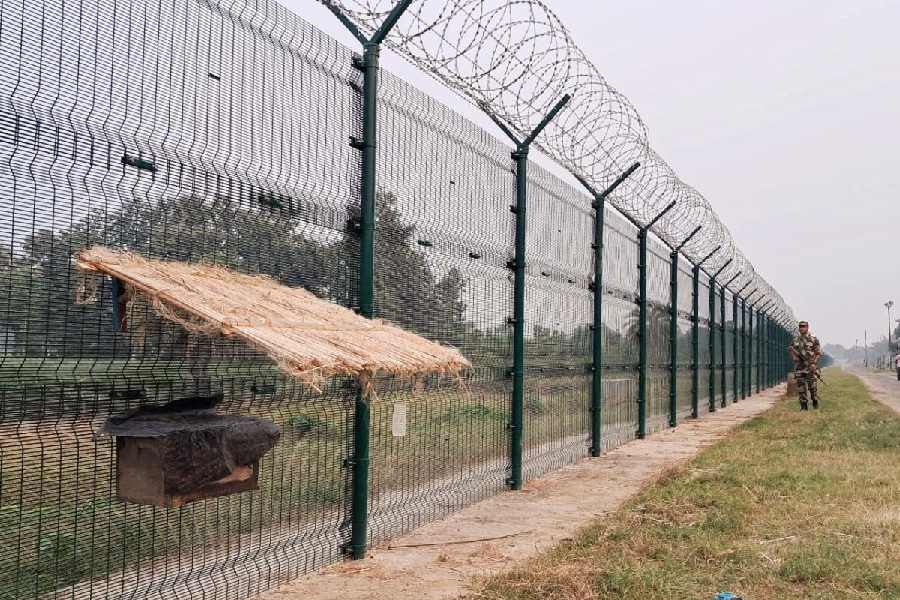The Centre on Tuesday told the Supreme Court that there was no official data available with the government on the number of illegal migrants who had entered the country as they had come without valid documents in a clandestine and surreptitious manner and their detection was a complex task.
A five-judge bench headed by Chief Justice of India D.Y. Chandrachud, before whom the data relating to the steps taken to check illegal migrants was placed by solicitor-general Tushar Mehta, reserved its verdict on a batch of petitions challenging the insertion of Section 6A in the Citizenship Act.
The bench, which included Justices Surya Kant, M.M. Sundresh, J.B. Pardiwala and Manoj Misra, had on December 5 commenced hearing of a batch of petitions challenging the constitutional validity of Section 6A of the Citizenship Act, 1985, pertaining to illegal migration to Assam from Bangladesh, including the question whether the influx amounted to external aggression of India.
At the last hearing on December 7, the bench had asked Mehta to file a joint affidavit on behalf of the Centre and the Assam government giving data relating to the number of illegal migrants in the country, not just for Assam. Pursuant to the direction, the Centre and the Assam government have filed the affidavit. The Centre has accused the Bengal government of not extending adequate cooperation in facilitating the border fencing with Bangladesh, resulting in the influx of illegal migrants.
The government said: “The number of persons to whom citizenship has been granted under the provisions of Section 6A(2), namely, persons who came into Assam between 1 January 1966 and 25 March 1971, is 17,861 (persons who had registered their names with FRRO (Foreigners Regional Registration Office) till 31-10-2023).”
On the number of persons who have been detected to be foreigners by an order of the Foreigners Tribunal under the Foreigners (Tribunal) Order 1964 for the period of 1966-1971, “it is humbly submitted that the number is 32,381 (till 31-10-2023)”, the affidavit said.
However, with regard to the top court’s query on “the estimated inflow of illegal migrants into India, including but not confined to the state of Assam, after 25 March, 1971”, the affidavit said: “Illegal migrants enter into the country without valid travel documents in a clandestine and surreptitious manner. The detection, detention and deportation of such illegally staying foreign nationals is a complex ongoing process.”
The government added: “Since entry of such foreign nationals into the country is clandestine and surreptitious, it is not possible to collect accurate data of such illegal migrants living in various parts of the country.”
According to the Centre, India shares a 4,096.7km land and riverine border with Bangladesh. It passes through Bengal, Meghalaya, Mizoram, Tripura and Assam. The border is porous and criss-crossed by rivers, hilly and mountainous terrains. For the entire border, about 81.5 per cent fencing has been completed along the feasible stretches.
The affidavit goes on to say that it is unable to carry out fencing on some stretches due to problems posed by the Bengal government.
“It is submitted that a feasible length of 435.504km remains to be covered by a fence. It is submitted that out of the same, about 286.35km is pending due to Land Acquisition. Despite all efforts, the progress has been substantially hindered due to the pending Land Acquisition issues with the Government of West Bengal,” the affidavit said.
It added: “The State government has not adopted The Right to Fair Compensation and Transparency Land Acquisition, Rehabilitation and Resettlement Act, 2013. As per this Act, in cases of urgency, the Appropriate Government can take possession of any land needed for a public purpose and such land shall thereupon vest absolutely in the Government, free from all encumbrances.
“It is submitted that the West Bengal Government follows a far slower, more complex Direct Land Purchase Policy even for national security projects such as border fencing. Due to the non- cooperation from the State Government regarding resolving various issues of Land Acquisition, considerable delays have occurred in acquiring the necessary land, thereby impeding the timely completion of fencing in West Bengal along Indo-Bangladesh border which is a vital national security project...”











